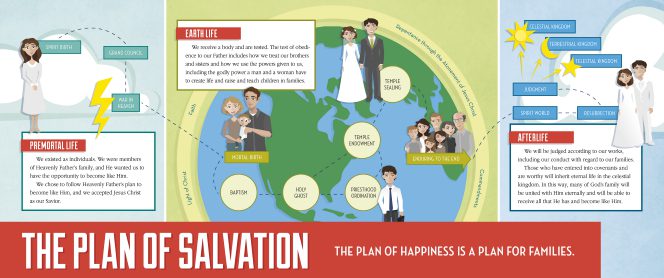
Last night, I was invited to join an online discussion about the supposed contradiction between the teaching and practice of polygamy (or, as Mormons tend to call it, plural marriage, or, most accurately, polygyny), by the Church of Jesus Christ of Latter-day Saints in the nineteenth century, and the twenty-first century opposition of that church to same-sex marriage.
I took a quick glance at the discussion and decided that it wasn’t a serious one. It reminded me just a bit of somebody’s criticism of (I think) Katherine Hepburn, to the effect that her acting “runs the entire emotional gamut from A to B.”
There was unanimous consensus that Mormons are guilty of “hypocrisy” (variously spelled) on the matter, and the very first comment (immediately endorsed by the discussion’s originator), explained that Mormons take the position that they do “Because like most conservatives, they are about repression, not about people being happy. Polygamy is oppressive to women, LGBTs getting married is leaving repression behind, and they can’t have that.”
I’m not a fan of conversations in which people can’t admit the moral decency of those with whom they disagree, and, when the discussion begins with the assumption that my position results from depravity, from sheer otherwise-unmotivated evil, I just can’t muster much interest for participating in it.
However, I promised that I would address the supposed contradiction between onetime support for plural marriage and modern rejection of gay marriage. So here’s my response:
There is no contradiction.
The originator of that “discussion” sees a clash between current LDS support of “traditional marriage” and past LDS support for a non-traditional form of marriage.
But that’s not the relevant angle of analysis. It was never about “tradition” as such.
The relevant fact is that “traditional” monogamy and Mormon polygyny are and were, both of them, forms of heterosexual marriage. Until 2015, when the Supreme Court of the United States voted 5-4 to change the definition of marriage, marriage had only been a heterosexual institution in the United States. It has only been in the last couple of decades, really, that anybody has ever suggested that it should be otherwise.
Across time and across cultures, acceptable ages for marriage have varied. Different degrees of kinship-marriage have been permitted. Monogamy has been the norm, but polygyny has been practiced in many cultures and continues to be practiced in some. Same-sex marriage, by contrast, is a distinctly recent innovation without real precedent anywhere.
For theological reasons of its own, because families founded upon parenthood and upon opposite-gender parents play an essential role in its view of “the plan of salvation,” the Church of Jesus Christ of Latter-day Saints is exceptionally committed to heterosexual marriage. It also believes and teaches that, in this life, the best place for children is in an intact home with a father and a mother.
However, in supporting heterosexual marriage and, when the subject recently arose, opposing the redefinition of marriage to include same-sex couples, the Church is aligned with all religious traditions and all cultures in every period of human history down until very recent years (in western Europe and derivative cultures), and with virtually all religious traditions and cultures even today. And, in its belief that children should, if possible, be raised by their biological fathers and biological mothers, the Church is supported by considerable social-scientific research.
Others are entirely welcome to disagree with that position. But they shouldn’t mischaracterize it. The Church of Jesus Christ of Latter-day Saints doesn’t endorse faithful heterosexual marriage and parenthood and reject homosexual “marriage” out of hatred, or opposition to happiness, or a desire to oppress.
And the question isn’t the Church’s inconsistent allegiance to “tradition.” The Church has always been willing to break with tradition. Its very existence represents a rejection of tradition. It doesn’t support heterosexual marriage because heterosexual marriage is “traditional,” but because, with all love and good will, it regards such marriage as the optimal arrangement for men, women, and children and believes heterosexual marriage to be a vital part of God’s plan for all of humankind.
P.S. In connection with the topic of the Latter-day Saint attitude toward homosexuals, please read and (as I did) enjoy this marvelous item, brought to my notice by Kevin Taylor.











